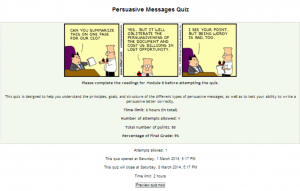LMS Assessment
Reflection
“The most reliable, rigorous and cheat-proof assessment systems are often accompanied by dull and lifeless learning that has short lasting outcomes” (Gibbs & Simpson, 2005, p. 3).
A multitude of studies (as cited by Gibbs & Simpson, 2005, p.4) have shown that, in higher education, one of the most influential features that determines student success and motivation is feedback. However, as described in their journal, as class sizes have increased due to economies of scale, the cost of formative assessment has also increased. According to Gibbs & Simpson, other issues with feedback include feedback being disregarded by students, the psychological effects of grades, and ineffective feedback given by teachers. These effects are magnified in an online setting; due to this, students in an online setting may receiver up to 50 times as much feedback on assignments as students at conventional universities (Gibbs & Simpson, 2005, p. 9).
This assignment required a quiz with a very specific format (a combination of multiple choice, matching, short answer and essay questions) that excluded some of the more socially constructive methods of assessment; however, under certain conditions, according to Prensky (2001) machine evaluations can be effective learning devices (as cited by Anderson, 2009). One of these conditions is that assessment needs to occur frequently (Gibbs & Simpson, 2005). For this module, the quiz allows students to test their knowledge on persuasive messages prior to engaging in the collaborative writing projects, so that students are kept up-to-date and possess the requisite level of knowledge to work on the task with their peers. Furthermore, the quiz reflects the learning objectives of the module (that are illustrated on the course schedule), so Gibbs & Simpson’s second condition, that tasks orient students to allocate appropriate amounts of time and effort to the most important aspects of the course (p. 14).
Since the quiz was designed to reflect the conditions of formative (as opposed to summative) assessment, the quiz was designed so that students were able to answer the multiple choice, matching and short-answer questions up to 3 times with no penalty; as well, feedback was provided for both incorrect answers as well as complete answers. By allowing for this, Gibbs & Simpsons 4th, 5th and 6th conditions were satisfied, as feedback was repeatedly given after small chunks of course content; explanatory feedback is given; and feedback is received immediately after the question is answered (Gibbs & Simpson, 2005, 17-19). As such, the feedback given was designed to scaffold the students’ knowledge so that they would be better able to complete the more demanding and metacognitive letter writing tasks at the end of the quiz.
References
Anderson, T. (2008b). Teaching in an Online Learning Context. In: Anderson, T. & Elloumi, F. Theory and Practice of Online Learning. Athabasca University.
Gibbs, G. & Simpson, C. (2005). “Conditions under which assessment supports students’ learning.” Learning and Teaching in Higher Education.
